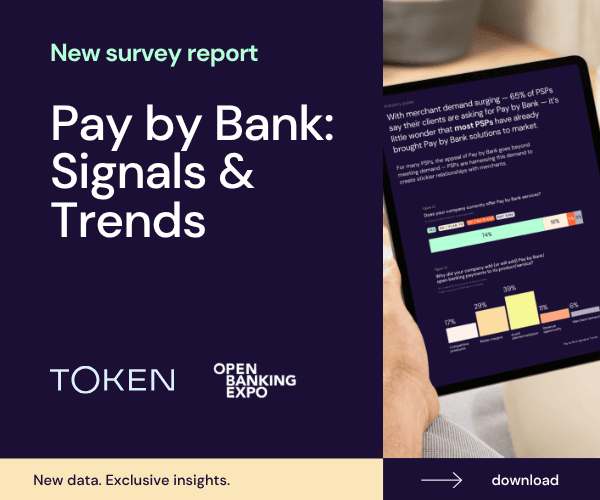
A shot in the arm for business banking
OpenBankingExpo | News
12 Sep 2019
A recent whitepaper published by Banking Circle, entitled Financial inclusion for Europe’s SMEs: Building a Circle of Trust, found that the smallest firms in the European Union are twice as concerned about access to financial services as their large and medium-sized cousins.
The research concluded that without access to finance, a quarter of European SMEs would be forced to make staff redundancies, while 40 per cent would be unable to afford the equipment they need to remain competitive among their peers.
“For small companies, access to flexible and fairly-priced banking services still means the difference between increased sales and selling up, demonstrating the importance of financial inclusion,” says Anders la Cour, co-founder and chief executive officer of Banking Circle.
“The barriers identified by this latest research are making life more and more difficult for SMEs, but there’s also light at the end of the tunnel – with industry collaboration and creativity the vicious circles can be transformed into virtuous circles of provision, availability and use.”
The tides are turning for SMEs and with the introduction of Open Banking and PSD2 there is a real opportunity for them to demand more from a banking relationship.
Parth Desai, founder and CEO of Open Banking hub PelicanPay, says: “For the first time, SMEs have more choice and a new-found ability to manage their operations and finances thanks to an array of innovations. They can access new products by alternative providers that are designed to respond to their needs.”
Separate research carried out by international payments, treasury management and foreign-exchange specialist Centtrip found 74 per cent of UK businesses believe they will benefit from Open Banking within two years.
The fintech’s study also reveals that 64 per cent of businesses agree Open Banking will save them time and 58 per cent believe it will save them money.
“Open Banking has a huge potential to shift the way financial data is shared and managed, says Brian Jamieson, CEO and co-founder of Centtrip.
“We are just starting to understand its benefits and the way it may reshape the financial sector. Even so, many business leaders have yet to reap its rewards and realise its potential to revolutionise the way businesses approach and manage their financial information.”
He adds: “Collaboration between fintech and banks is the root to its success. By joining efforts, they can do a lot more.”
Over recent months, Banking Competition Remedies has been awarding grants to a number of banks and building societies specifically designed to develop and improve the financial products and services that are available to SMEs.
Among the recipients so far are Nationwide Building Society, Investec Bank, Co-operative Bank, Metro Bank, Starling and ClearBank, all of which have received amounts from the £775m scheme that was set up with cash from RBS as a condition of its bailout following the financial crisis.
Chris Allen, digital and innovation director at global financial services consulting firm Axis Corporate, explains: “Many of the awards reflected a preference for improving financing to the SME community with winning organisations committing to increase the amount of lending to this sector. We expect this to have a significant impact.”
Allen cites the recent Consumer Priorities for Open Bankingreport from the Open Banking Implementation Entity’s Independent Entities, which found that over a third of SMEs spend four hours per week chasing late payments, while the process of securing credit (and 36 per cent of SMEs rely on credit) is protracted and frequently fruitless. He argues that SMEs can expect many complementary services – cashflow forecasting, invoice capture, payroll management, accounting integration and international payments – to become commonplace.
He adds: “Potential solutions include new tools to enhance productivity and deliver insight on business performance; automated tools to optimise cashflow and earn returns on positive balances; improved and competitive access to relevant financial products and reduced costs on payments – international payments in particular.
“SMEs repeatedly say that want help with running their businesses and financial education. What remains to be seen is if they would prefer this to be provided by banks or an entirely new breed of ‘distributed banking’ providers. Would you rather log on to your online bank to look for a loan or have your accountancy package suggest that you need one, find you the right deal for your needs and take some of the friction out of the application process? There is a real opportunity for the banking sector to do more for small businesses, working with them to support growth and importantly help them survive during turbulent times.”
PelicanPay’s Parth Desai agrees that SMEs want Open Banking to make their lives easier and free up time to focus on core activities.
“They are looking for simpler and easier ways to operate their business accounts, manage invoicing and improve their operational efficiencies. They seek time, efficiency and cost savings so that they can focus on their business objectives rather and financial management,” he says, but reiterates that the needs of SMEs are not being met consistently. “Despite the emergence of challenger banks and fintechs, there is a gap between the increasing expectations of SMEs and what is being offered by incumbent players in the market.”
For Rolands Mesters, CEO and co-founder of account data analytics company Nordigen, banks have long catered to low risk enterprises and private individuals first, and SMEs second.
He says. “It’s no surprise why: banks are risk-averse by nature, and SMEs often fail. This is part of the reason SMEs in the UK and Europe are under-financed and rely upon venture capital, family funds and bootstrapping.
“We need to remember that banks evaluate risk well, provide good financial support for corporates and solve numerous financial problems. However, there is always room for innovation. Nordigen, like many other SMEs in the technology sector, would love to see improved and increased funding options for tech companies – especially given that the sector is moving so quickly and represents scalable growth.”
Research by Finasra, in association with YouGov, shows an appetite for SMEs to engage in the new types of services enabled by Open Banking, as well as highlighting an opportunity for challenger banks to gain market share within this segment.
Mary Connor, director of product management, Retail Banking, at Finastra, explains: “One third of recent switchers in our survey now hold their main account with challengers. But these banks will have to work hard to keep them. 59 per cent of those that said they have switched providers in the last three years said they are likely to switch again as they shop around for the best service and value.
“It’s apparent that all banks will need to up their game to retain SME customers long term. This can only be good for entrepreneurs in the future.”
Dr Gavin Scruby, CIO at payments firm SmartDebit, however, has a word of caution: “We should never forget the old IT adage ‘customers only know what they want after they see it’. That applies as much to banking services as anything else.”









